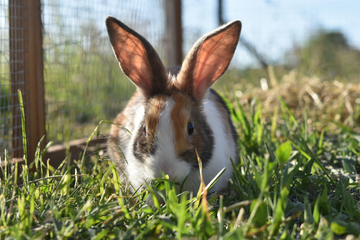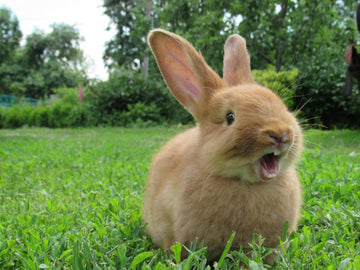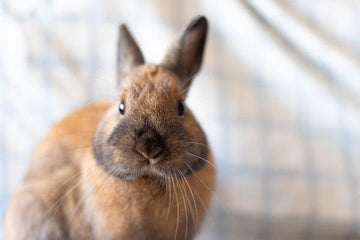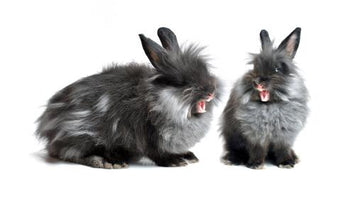Do Rabbits Fart? The Truth Explained!
Rabbits are full of surprises. From their adorable twitching noses to their binkies across the living room, they keep us entertained and curious. But one question might have crossed your mind, "Do rabbits fart?" It may seem funny, but understanding this seemingly small detail is essential for caring for your bunny. In fact, gas-related issues can lead to serious health issues, and possibly life-threatening.
Click Here For a Guide to Understanding Your Rabbits Diet.

In this blog, we’ll explain the science behind rabbit digestion, confirm whether rabbits really pass gas, and explore why it matters for their health. If you want to ensure your bunny is living its best, and less gassy, life this blog is for you.
Understanding Rabbit Digestion
Rabbits are herbivores, thriving on fibrous plants like hay and leafy greens. Their digestive systems are uniquely designed to extract nutrients from tough plant material. The key to their digestive process is called hindgut fermentation.
Hindgut fermentation happens in a rabbit’s cecum. The cecum, located at the beginning of the large intestine, is home to billions of bacteria and microorganisms. These tiny helpers break down plant fibers into nutrients the rabbit can absorb. But this process produces gases as a natural byproduct.
Most of the time, the gases are harmless. Some are absorbed into the bloodstream, while the rest are expelled as farts. Spoiler alert, rabbits do fart!
Do Rabbits Fart?
As we answered previously—yes, rabbits fart. Unlike other animals, rabbit farts are typically silent and odorless, thanks to their plant-based diet. While this might seem like a funny fact, it’s quite important. Farting is a sign of a healthy digestive system in rabbits.

But when rabbits can’t pass gas, things can get serious. Gas buildup can lead to discomfort and more severe issues, such as gastrointestinal stasis (GI stasis), which can be life-threatening.
What Happens When Gas Builds Up?
Gas buildup in rabbits is more than just an annoyance—it’s dangerous. When gas accumulates, it can cause bloating and pressure in the stomach and intestines. This can make your rabbit very uncomfortable and lead to GI stasis, where the digestive system slows or stops entirely.
Signs of Gas Pain

It’s important to recognize when your rabbit might be experiencing gas-related discomfort. Look for these signs:
-
Refusing food or water.
-
Hunching over or pressing their abdomen to the floor.
-
Grinding their teeth (a sign of pain).
-
Lethargy or lack of movement.
-
A swollen or hard belly.
If you notice any of these symptoms, contact your veterinarian immediately. GI stasis can worsen quickly and may become fatal if not treated.
What Causes Gas in Rabbits?
Several factors can lead to excessive gas in rabbits. Knowing these causes can help you prevent problems before they start.
1. A Poor Diet
The number one cause of gas in rabbits is a diet low in fiber or high in sugar. Rabbits need a steady supply of hay, like Timothy hay, which helps keep their digestive system healthy. Foods like sugary fruits or starchy vegetables can upset their gut bacteria, leading to gas buildup. To learn more, check out our Timothy Hay blog.
2. Lack of Exercise
Rabbits are active animals. When they don’t get enough exercise, their digestive systems can slow down, increasing the risk of gas buildup. Ensure your bunny has plenty of room to hop, run, and explore.
3. Stress
Stress can disrupt a rabbit’s digestive system. Changes in their environment, the introduction of new pets, or loud noises can all stress out your bunny.
4. Sudden Changes in Diet
Rabbits have delicate digestive systems, and sudden changes in diet can upset their gut bacteria. When introducing new foods, do so gradually and in small amounts.
How to Prevent Gas in Rabbits
Prevention is the best way to keep your rabbit healthy and free from gas-related issues. Here are some tips:
1. Feed a High-Fiber Diet
Hay should comprise about 80-90% of your rabbit’s diet. High-quality hay, such as Timothy hay, is crucial for keeping their digestive system healthy. Fresh hay should always be available to your rabbit, as it not only supports digestion but also aids in wearing down their teeth.
2. Provide Fresh Water
Hydration is key to smooth digestion. Always make sure your rabbit has access to fresh, clean water. Keep the water fresh by changing their water daily and cleaning the bowl or bottle to prevent bacteria buildup. Proper hydration also helps soften food as it moves through their system, reducing the risk of blockages or gas buildup.
3. Encourage Exercise
Physical activity helps keep a rabbit’s digestive system moving and keeps them stimulated. Give them space to hop, run, and play every day. Create a safe and engaging play area with tunnels, toys, and cardboard boxes to keep your bunny active and entertained.
4. Avoid Gas-Inducing Foods
Limit or avoid vegetables like broccoli, cauliflower, and cabbage, which can produce excess gas in rabbits. Instead, stick to rabbit-safe greens in limited supply, such as romaine lettuce, parsley, or cilantro. Introduce new foods slowly, as even safe greens can cause digestive upset if offered in large quantities too quickly. Keep sugary fruits and treats to a minimum, as these can disrupt the balance of bacteria in your rabbit’s gut and lead to bloating.
What to Do If Your Rabbit Has Gas

If you suspect your rabbit has gas, there are a few things you can try:
-
Gently massage their abdomen to help move the gas through their system.
-
Encourage them to move around, as exercise can help relieve gas buildup.
-
Offer fresh, fragrant herbs like mint or parsley to stimulate appetite and digestion.
However, if your rabbit doesn’t improve or appears to be in significant pain, seek veterinary care immediately. Gas buildup can progress into GI stasis, which requires professional treatment.
Why This Matters
Now that you know rabbits do fart, you can appreciate why it’s a sign of a healthy digestive system. More importantly, you can recognize when gas might indicate a serious health issue. By feeding a high-fiber diet, encouraging exercise, and providing a stress-free environment, you can keep your rabbit’s digestive system in good shape.
For more tips on rabbit health, check out our blog on making sure your rabbit it healthy. If you're new to rabbit care, explore our Rabbit Starter Kit for everything you need to get started.
Understanding your rabbit’s unique biology is the key to keeping them healthy and happy. So, the next time someone asks, “Do rabbits fart?” you can confidently answer yes—and explain why it’s so important!

Rabbit Is It Low Maintenance or More Work Than You Think?

Tips to Manage Rabbit Chewing Habits

Signs of Rabbit Health: What You Should Know







